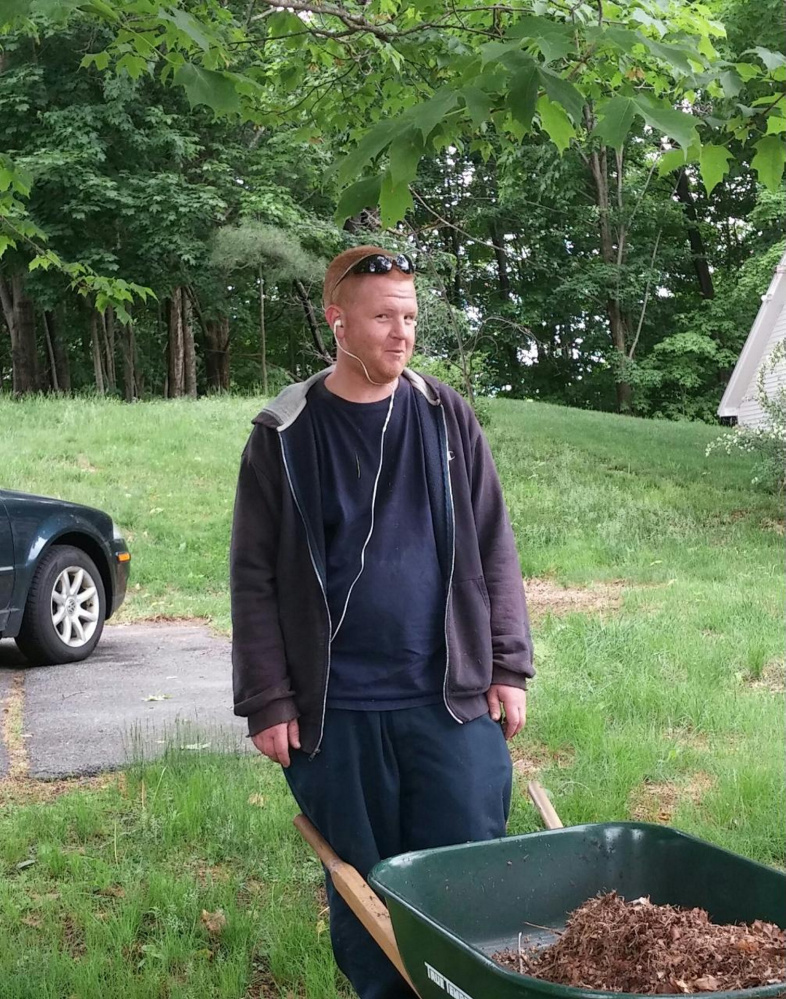Only after Kristina Goodwin broke in the door to her brother’s room and discovered him slumped in a chair did she believe that he might die of a heroin overdose.
“I would always tell him, ‘If you keep on going the way that you’re going, you’re going to die,’ ” Goodwin said. “But I would say it as a scare tactic. I would say it with so much anger and so much tears that it was crazy. But I didn’t actually expect that he would die.”
Goodwin’s younger brother, Michael Fielders, 31, overdosed on Nov. 3, dying at his grandparents’ house in Eliot, where he’d been living for several months. He had been fighting opioid addictions for five years, his family said, starting with abusing prescription opioids and then turning to heroin about two years ago.
Goodwin and her husband, Kevin, had to kick in the locked door to get to Fielders about 1 p.m. that day. Her grandparents had called her, concerned because her brother hadn’t left his room. She said they expected to find him passed out, or sleeping late, and were shocked to realize that he was dead.
Fielders’ family is sharing the details of his death in hopes that it will spur the state and federal governments to expand access to drug treatment programs. They have started a www.moveon.org petition urging officials to take action.
Heroin overdose deaths have soared in Maine, going from seven in 2009 to 57 in 2014, with this year on track to surpass last year.
“We can’t let this be for nothing,” Kristina Goodwin said.
The petition comes as a bipartisan group of state legislative leaders on Wednesday announced a $4.8 million initiative, with the dollars split evenly between treatment and enforcement efforts.
Although Gov. Paul LePage has expressed skepticism about the effectiveness of treatment, including at a public forum Tuesday in Portland, he has not ruled out including treatment in a comprehensive plan to tackle the heroin crisis. LePage, in a statement released Wednesday, praised lawmakers for agreeing to fund 10 additional Maine Drug Enforcement Agency agents to combat heroin trafficking, but didn’t specifically back the bipartisan plan. His office declined further comment Wednesday afternoon.
The Maine Department of Health and Human Services has reported that about $77 million was spent on various forms of substance abuse treatment in 2014-15, a slight increase over previous years. In a Nov. 10 op-ed published in the Portland Press Herald, Mary Mayhew, health and human services commissioner, said that “99 percent of adults age 26 or older who needed addiction treatment for illicit drug use were able to receive it.”
But substance abuse experts say that demand for treatment exceeds the availability, and access to treatment is still difficult, especially for those who, like Fielders, are uninsured.
In August, LePage suggested in a radio address that a DHHS fund for drug programs had “hundreds of thousands of dollars” in treatment funds that went unused, prompting substance abuse workers to ask where they could find the extra treatment money. State health department officials have provided only basic information about the unexpended funds, noting only that spending on drug treatment overall has gone up under LePage.
Those seeking treatment for opiate use has increased from 1,115 in 2010 to 3,463 in 2014, according to the Maine Office of Substance Abuse. Meanwhile, treatment options have shriveled, including this year’s closure of Mercy Recovery Center in Westbrook and Spectrum Health Systems in Sanford.
Fielders was on a waiting list to get into a residential program at the Salvation Army Adult Rehabilitation Center in Portland when he overdosed, said his mother, Cynthia Fielders.
“Mikey was fighting hard. He was trying to get help. He wanted to get help, but help wasn’t there for him,” Goodwin said.
Portland Salvation Army Maj. Ronald Bernardi said the program is faith-based and not a substance-abuse treatment program, although many addicts seek help there. He said the program has “constantly” had a waiting list for the past two years.
Meanwhile, Cynthia Fielders said the family is raising their grandchildren, Bentlee, 3, and Mercedes, 2, both redheads like their dad. The children already were living with her, she said, because her son’s addiction meant he couldn’t care for them. The children’s mother is in prison for trafficking drugs, Fielders said.
While Mercedes doesn’t completely understand what happened, Bentlee wakes up at night yelling for his daddy, she said.
“He knows daddy is in heaven. He says he can close his eyes and see his daddy in heaven. He wants to drive to heaven to see his daddy and pick him up in the car,” Fielders said.
Fielders said that although her son’s death is painful, she wants people to see the aftermath of a drug overdose death and how it affects family and friends.
The first sentence of his obituary says he died of a heroin overdose, a decision that was questioned by the funeral home.
“They called me to ask if I was sure I wanted to do this. Normally you would say in the obituary that ‘he died unexpectedly at a young age.’ But I wanted to put it in because I wanted people to know what happened. I wanted people to know the truth,” Fielders said.
Fielders said the family hopes their story will help others.
“I can’t stay home curled up in a ball,” she said.
Fielders said her son’s story is similar to that told by many who have become addicted to heroin. Michael Fielders injured his back in 2009, getting hit by a snowplow while he was shoveling snow, she said. He was prescribed Percocet and almost immediately got addicted, she said.
His pain was so great that he could no longer work and had to give up his job detailing cars. He tried to keep busy by doing odd jobs with his father, Michael, Cynthia Fielders said.
But her son acquired more pills by “doctor shopping,” and when doctors would no longer prescribe him medication, he started buying pills illegally on the street. Two years ago, he turned to heroin. Four out of five new heroin users started by abusing prescription opioids, according to the National Institute on Drug Abuse.
Fielders said she looked into paying out-of-pocket for her son’s drug treatment, but when told that it would cost $18,000 up front, she realized they couldn’t afford it.
Sen. Susan Collins is urging action at the state and federal level, convening a congressional committee Tuesday to discuss the topic. One reform that the Maine Republican wants to see is removing the limit on the number of patients that physicians can treat for Suboxone, a medication that helps people wean themselves off opioids. Federal law limits a physician to a maximum of 100 patients with Suboxone, but Collins said the cap should be lifted so doctors can treat people in need.
“This is truly an epidemic,” she said. “I’m worried about the spread of this crisis.”
Another obstacle that limits access to substance abuse treatment, advocates say, is the state’s cutbacks to Medicaid. MaineCare, the state’s name for Medicaid, has declined from 355,000 patients in 2011 to 287,000 in 2015 as Maine has tightened eligibility requirements, especially for childless adults.
While Maine’s uninsured rate has declined over the past few years, those operating treatment programs have told the Press Herald that among the population that abuses heroin, the uninsured rate has increased because the people often have lost their jobs and no longer qualify for MaineCare. Also, those who earn less than 100 percent of the federal poverty level do not qualify for subsidies that make health insurance affordable under the federal Affordable Care Act.
For instance, at the Milestone Foundation in Portland, MaineCare reimbursements to treat substance-abuse patients have fallen by two-thirds since 2007, according to the foundation’s leaders.
The latest news on a potential bipartisan compromise is encouraging to those seeking action to help alleviate the heroin crisis.
“It feels more hopeful,” said Bob Fowler, executive director of the Milestone Foundation. “More people are coming together to recognize a need for a balanced approach.”
Staff Writer Steve Mistler contributed to this report.
Send questions/comments to the editors.





Comments are no longer available on this story